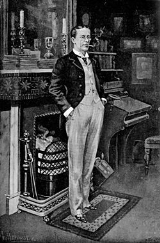
George Grossmith
Encyclopedia
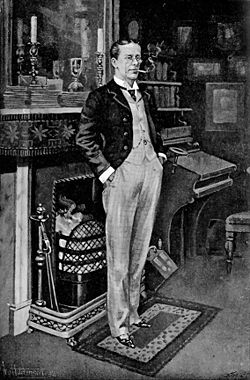
English people
The English are a nation and ethnic group native to England, who speak English. The English identity is of early mediaeval origin, when they were known in Old English as the Anglecynn. England is now a country of the United Kingdom, and the majority of English people in England are British Citizens...
comedian
Comedian
A comedian or comic is a person who seeks to entertain an audience, primarily by making them laugh. This might be through jokes or amusing situations, or acting a fool, as in slapstick, or employing prop comedy...
, writer, composer
Composer
A composer is a person who creates music, either by musical notation or oral tradition, for interpretation and performance, or through direct manipulation of sonic material through electronic media...
, actor, and singer. His performing career spanned more than four decades. As a writer and composer, he created 18 comic opera
Comic opera
Comic opera denotes a sung dramatic work of a light or comic nature, usually with a happy ending.Forms of comic opera first developed in late 17th-century Italy. By the 1730s, a new operatic genre, opera buffa, emerged as an alternative to opera seria...
s, nearly 100 musical sketches, some 600 songs and piano pieces, three books and both serious and comic pieces for newspapers and magazines.
Grossmith is best remembered for two aspects of his career. First, he created a series of nine memorable characters in the comic opera
Comic opera
Comic opera denotes a sung dramatic work of a light or comic nature, usually with a happy ending.Forms of comic opera first developed in late 17th-century Italy. By the 1730s, a new operatic genre, opera buffa, emerged as an alternative to opera seria...
s of Gilbert and Sullivan
Gilbert and Sullivan
Gilbert and Sullivan refers to the Victorian-era theatrical partnership of the librettist W. S. Gilbert and the composer Arthur Sullivan . The two men collaborated on fourteen comic operas between 1871 and 1896, of which H.M.S...
from 1877 to 1889, including Sir Joseph Porter, in H.M.S. Pinafore
H.M.S. Pinafore
H.M.S. Pinafore; or, The Lass That Loved a Sailor is a comic opera in two acts, with music by Arthur Sullivan and a libretto by W. S. Gilbert. It opened at the Opera Comique in London, England, on 25 May 1878 and ran for 571 performances, which was the second-longest run of any musical...
(1878), the Major-General in The Pirates of Penzance
The Pirates of Penzance
The Pirates of Penzance; or, The Slave of Duty is a comic opera in two acts, with music by Arthur Sullivan and libretto by W. S. Gilbert. The opera's official premiere was at the Fifth Avenue Theatre in New York City on 31 December 1879, where the show was well received by both audiences...
(1880) and Ko-Ko in The Mikado
The Mikado
The Mikado; or, The Town of Titipu is a comic opera in two acts, with music by Arthur Sullivan and libretto by W. S. Gilbert, their ninth of fourteen operatic collaborations...
(1885–87). Second, he wrote, in collaboration with his brother Weedon
Weedon Grossmith
Walter Weedon Grossmith , better known as Weedon Grossmith, was an English writer, painter, actor and playwright, best known as co-author of The Diary of a Nobody with his famous brother, music hall comedian and Gilbert and Sullivan star, George Grossmith...
, the 1892 comic novel Diary of a Nobody
Diary of a Nobody
The Diary of a Nobody, an English comic novel written by George Grossmith and his brother Weedon Grossmith with illustrations by Weedon, first appeared in the magazine Punch in 1888 – 89, and was first printed in book form in 1892...
.
Grossmith was also famous in his day for performing his own comic piano sketches and songs, both before and after his Gilbert and Sullivan days, becoming the most popular British solo performer of the 1890s. Some of his comic songs endure today, including "See Me Dance the Polka". He continued to perform into the first decade of the 20th century. His son, George Grossmith, Jr.
George Grossmith, Jr.
George Grossmith, Jr. was a British actor, theatre producer and manager, director, playwright and songwriter, best remembered for his work in and with Edwardian musical comedies...
, became a famous actor, playwright and producer of Edwardian musical comedies.
Life and career
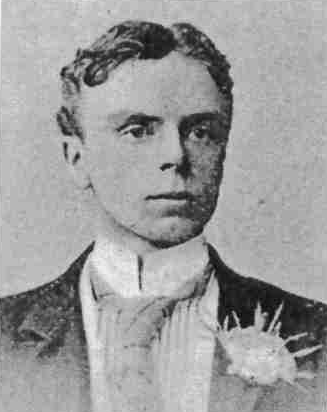
Islington
Islington is a neighbourhood in Greater London, England and forms the central district of the London Borough of Islington. It is a district of Inner London, spanning from Islington High Street to Highbury Fields, encompassing the area around the busy Upper Street...
, London
London
London is the capital city of :England and the :United Kingdom, the largest metropolitan area in the United Kingdom, and the largest urban zone in the European Union by most measures. Located on the River Thames, London has been a major settlement for two millennia, its history going back to its...
and grew up in St. Pancras and Hampstead
Hampstead
Hampstead is an area of London, England, north-west of Charing Cross. Part of the London Borough of Camden in Inner London, it is known for its intellectual, liberal, artistic, musical and literary associations and for Hampstead Heath, a large, hilly expanse of parkland...
, London. His father, also named George (1820–1880), was the chief reporter for The Times
The Times
The Times is a British daily national newspaper, first published in London in 1785 under the title The Daily Universal Register . The Times and its sister paper The Sunday Times are published by Times Newspapers Limited, a subsidiary since 1981 of News International...
and other newspapers at the Bow Street Magistrates' Court
Bow Street Magistrates' Court
Bow Street Magistrates' Court was the most famous magistrates' court in England for much of its existence, and was located in various buildings on Bow Street in central London close to Covent Garden throughout its history.-History:...
and was also a lecturer and entertainer. His mother was Louisa Emmeline Grossmith née Weedon (d. 1882). Over the years, Grossmith's father spent less of his time at Bow Street and more of it touring as a performer. As a young man, Grossmith was usually credited as "Jnr" to distinguish him from his father, especially when they performed together, but for most of his career, he was credited simply as "George Grossmith". Later, his actor-playwright-theatre manager son was credited as George Grossmith "Jr"
George Grossmith, Jr.
George Grossmith, Jr. was a British actor, theatre producer and manager, director, playwright and songwriter, best remembered for his work in and with Edwardian musical comedies...
rather than "III"; some sources confuse the two men. His other son, Lawrence Grossmith
Lawrence Grossmith
Lawrence Grossmith was a British actor, the son of Gilbert and Sullivan performer George Grossmith and the brother of actor George Grossmith, Jr.-Life and career:...
, was also a successful actor, primarily in America.
Grossmith had a younger sister, Emily, and younger brother, Weedon
Weedon Grossmith
Walter Weedon Grossmith , better known as Weedon Grossmith, was an English writer, painter, actor and playwright, best known as co-author of The Diary of a Nobody with his famous brother, music hall comedian and Gilbert and Sullivan star, George Grossmith...
. In 1855, he went to boarding school at Massingham House on Haverstock Hill in the district of Hampstead. There he studied the piano and began to amuse his friends and teachers with shadow pantomimes, and later by playing the piano by ear. His family moved to Haverstock Hill when young Grossmith was 10, and he became a day student. At the age of 12, he transferred to the North London Collegiate School in Camden Town
Camden Town
-Economy:In recent years, entertainment-related businesses and a Holiday Inn have moved into the area. A number of retail and food chain outlets have replaced independent shops driven out by high rents and redevelopment. Restaurants have thrived, with the variety of culinary traditions found in...
. He was back in St. Pancras by age 13. He was an avid amateur photographer and painter as a teenager, but it was his brother Weedon who went to art school. The Grossmith family had many friends engaged in the arts, including J. L. Toole, Ellen Terry
Ellen Terry
Dame Ellen Terry, GBE was an English stage actress who became the leading Shakespearean actress in Britain. Among the members of her famous family is her great nephew, John Gielgud....
, Henry Irving
Henry Irving
Sir Henry Irving , born John Henry Brodribb, was an English stage actor in the Victorian era, known as an actor-manager because he took complete responsibility for season after season at the Lyceum Theatre, establishing himself and his company as...
, H. J. Byron, Tom Hood
Tom Hood
Tom Hood , was an English humorist and playwright, son of the poet and author Thomas Hood. A prolific author, he was appointed, in 1865, editor of the magazine Fun. He also founded Tom Hood's Comic Annual in 1867....
, T. W. Robertson, and John Hollingshead
John Hollingshead
John Hollingshead was an English theatrical impresario, journalist and writer during the latter half of the 19th century. He is best remembered as the first manager of the Gaiety Theatre, London...
(later, the manager of the Gaiety Theatre, London
Gaiety Theatre, London
The Gaiety Theatre, London was a West End theatre in London, located on Aldwych at the eastern end of the Strand. The theatre was established as the Strand Musick Hall , in 1864 on the former site of the Lyceum Theatre. It was rebuilt several times, but closed from the beginning of World War II...
).
Grossmith had hoped to become a barrister
Barrister
A barrister is a member of one of the two classes of lawyer found in many common law jurisdictions with split legal professions. Barristers specialise in courtroom advocacy, drafting legal pleadings and giving expert legal opinions...
. Instead, he worked for many years, beginning in the 1860s, training and then substituting for his father as the Bow Street reporter for The Times, among other publications, when his father was on his lecture tours. Among the cases on which he reported was the Clerkenwell bombing by the Fenians in 1867. At the same time as he began reporting, he began to write humorous articles for periodicals and to participate in amateur theatrical performances. He also joined his father in his entertainments, lectures, and imitations, and began to add music to the entertainments, which his father had not done. In 1873, Grossmith married Emmeline Rosa Noyce (d. 1905), the daughter of a neighbourhood physician, whom he had met years earlier at a children's party. The couple had four children: George
George Grossmith, Jr.
George Grossmith, Jr. was a British actor, theatre producer and manager, director, playwright and songwriter, best remembered for his work in and with Edwardian musical comedies...
, Sylvia (23 September 1875–1932; married Stuart James Bevan in 1900), Lawrence and Cordelia Rosa (31 March 1879–1943). The family lived initially in Marylebone
Marylebone
Marylebone is an affluent inner-city area of central London, located within the City of Westminster. It is sometimes written as St. Marylebone or Mary-le-bone....
before moving, about 1885, to 28 Dorset Square nearby.
Early performing career
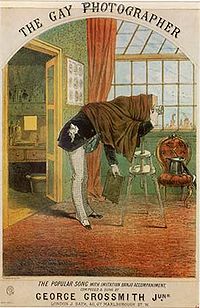
Society (play)
Society was an 1865 comedy drama by Thomas William Robertson regarded as a milestone in Victorian drama because of its realism in sets, costume, acting and dialogue. Unusually for that time, Robertson both wrote and directed the play, and his innovative writing and stage direction inspired George...
, at the Gallery of Illustration, in 1868. The after-piece was a burlesque, written by Grossmith's father, on the Dickens
Charles Dickens
Charles John Huffam Dickens was an English novelist, generally considered the greatest of the Victorian period. Dickens enjoyed a wider popularity and fame than had any previous author during his lifetime, and he remains popular, having been responsible for some of English literature's most iconic...
play No Thoroughfare
No Thoroughfare
No Thoroughfare is a stage play and novel by Charles Dickens and Wilkie Collins, both released in December 1867.-Background:In 1867 Charles Dickens and Wilkie Collins collaborated to produce a stage play titled No Thoroughfare: A Drama: In Five Acts. This was the last stage production to be...
. He then played the title role in Paul Pry, a comedy by Poole, also at the Gallery of Illustration, in 1870. But he and his father felt that his talents lay in "sketch" comedy rather than theatre. The younger Grossmith admired the comic pianist and entertainer John Orlando Parry
John Orlando Parry
John Orlando Parry was an English actor, pianist, artist, comedian and singer.-Early career:Parry, the only son of Welsh musician John Parry , was born in London and, at an early age, was taught by his father to sing and to play the harp and the piano. He also studied the harp under Robert Bochsa...
, who created and performed in many of the German Reed Entertainment
German Reed Entertainment
German Reed Entertainment was founded in 1855 and operated by Thomas German Reed together with his wife, Priscilla Reed née Horton...
s, and he tried to emulate Parry in developing his own sketches, consisting of humorous anecdotes, mildly satirical comment, ad lib chat, and comic songs centred on the piano.
Grossmith took to the professional stage in 1870 with a sketch called Human Oddities, written by his father, and a song called "The Gay Photographer" (that is, the "carefree" photographer). The song, with words by Grossmith's father and music by young Grossmith, concerns a photographer who broke the heart of a young lady named Miss Jenkins; so she drank his chemicals and died. In late 1870, the younger Grossmith appeared on his own with a nightly spot at the "old Polytechnic
University of Westminster
The University of Westminster is a public research university located in London, United Kingdom. Its origins go back to the foundation of the Royal Polytechnic Institution in 1838, and it was awarded university status in 1992.The university's headquarters and original campus are based on Regent...
" in Regent Street, where comic sketches alternated with scientific and serious lectures for the entertainment of the public. Human Oddities and another sketch, The Yellow Dwarf, were successful for Grossmith, and he took the former work on tour for six months. An 1871 Grossmith sketch was called He was a Careful Man. Biographer Tony Joseph notes that, except for a few early pieces, nearly all of Grossmith's material was written and composed by Grossmith himself. Joseph describes the sketches as "a light-hearted sending up of various aspects of contemporary life and manners. ...he was the complete performer... as a pianist (he performed for the most part sitting at a piano)... as a raconteur... as a mimic, facial expression, timing—he had it all. A short, dapper figure, he turned his lack of inches to positive advantage, and audiences took to him everywhere."
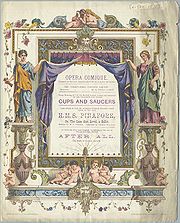
The Sorcerer
The Sorcerer is a two-act comic opera, with a libretto by W. S. Gilbert and music by Arthur Sullivan. It was the British duo's third operatic collaboration. The plot of The Sorcerer is based on a Christmas story, An Elixir of Love, that Gilbert wrote for The Graphic magazine in 1876...
in 1877. Also in 1871, at the Polytechnic, he performed three more sketches, The Puddleton Penny Readings, Theatricals at Thespis Lodge and The Silver Wedding (including what would be one of his most popular songs, "I am so Volatile", with words by his father). On 14 February 1872, Grossmith gave a sketch parody of a penny reading at the Gaiety Theatre, London
Gaiety Theatre, London
The Gaiety Theatre, London was a West End theatre in London, located on Aldwych at the eastern end of the Strand. The theatre was established as the Strand Musick Hall , in 1864 on the former site of the Lyceum Theatre. It was rebuilt several times, but closed from the beginning of World War II...
, since on Ash Wednesday
Ash Wednesday
Ash Wednesday, in the calendar of Western Christianity, is the first day of Lent and occurs 46 days before Easter. It is a moveable fast, falling on a different date each year because it is dependent on the date of Easter...
, theatres refrained from presenting costumed performances out of respect for the holiday. At the time, coincidentally, the Gaiety was presenting Thespis
Thespis (opera)
Thespis, or The Gods Grown Old, is an operatic extravaganza that was the first collaboration between dramatist W. S. Gilbert and composer Arthur Sullivan. No musical score of Thespis was ever published, and most of the music has been lost...
, Gilbert and Sullivan
Gilbert and Sullivan
Gilbert and Sullivan refers to the Victorian-era theatrical partnership of the librettist W. S. Gilbert and the composer Arthur Sullivan . The two men collaborated on fourteen comic operas between 1871 and 1896, of which H.M.S...
's first collaboration. Throughout these years, Grossmith continued working at Bow Street during the day.
In 1873, Grossmith and his father began joint tours of humorous recitations and comic sketches at literary institutes and public halls, to church groups and to branches of the YMCA all over England and even in Scotland and Wales. Young Grossmith's sketches at this time included The Puddleton Penny Readings, Our Choral Society and In the Stalls. They toured almost constantly for the following three years, but they returned to see their families in London on weekends. Around this time, he met and became firm friends with Fred Sullivan
Fred Sullivan
Frederic Sullivan was an English actor and singer. He is best remembered as the creator of the role of the Learned Judge in Gilbert and Sullivan's Trial by Jury, providing a model for the comic roles in the later Savoy Operas composed by his brother Arthur Sullivan.By 1870, Sullivan had abandoned...
, and afterwards, he met Sullivan's brother Arthur
Arthur Sullivan
Sir Arthur Seymour Sullivan MVO was an English composer of Irish and Italian ancestry. He is best known for his series of 14 operatic collaborations with the dramatist W. S. Gilbert, including such enduring works as H.M.S. Pinafore, The Pirates of Penzance and The Mikado...
. Through Arthur Cecil
Arthur Cecil
Arthur Cecil Blunt, better known as Arthur Cecil was an English actor, comedian, playwright and theatre manager. He is probably best remembered for playing the role of Box in the long-running production of Cox and Box, by Arthur Sullivan and F. C...
, Sullivan, and some of their friends, Grossmith began to be invited to entertain at private "society" parties, which he continued to do throughout his career. Later, these parties would often occur late in the evening after Grossmith performed at the Savoy Theatre
Savoy Theatre
The Savoy Theatre is a West End theatre located in the Strand in the City of Westminster, London, England. The theatre opened on 10 October 1881 and was built by Richard D'Oyly Carte on the site of the old Savoy Palace as a showcase for the popular series of comic operas of Gilbert and Sullivan,...
. In 1876, he collaborated with Florence Marryat
Florence Marryat
Florence Marryat was a British author and actress. The daughter of author Capt. Frederick Marryat and his wife Catherine, she was particularly known for her sensational novels and her involvement with several celebrated spiritual mediums of the late nineteenth century...
, the author and reciter, on Entre Nous. This piece consisted of a series of piano sketches, alternating with scenes and costumed recitations, including a two-person "satirical musical sketch", really a short comic opera
Comic opera
Comic opera denotes a sung dramatic work of a light or comic nature, usually with a happy ending.Forms of comic opera first developed in late 17th-century Italy. By the 1730s, a new operatic genre, opera buffa, emerged as an alternative to opera seria...
, called Cups and Saucers
Cups and Saucers
Cups and Saucers is a one-act "satirical musical sketch" written and composed by George Grossmith. It was first produced in 1876 on tour as a vehicle for Grossmith and Florence Marryat, as part of Entre Nous, their series of piano sketches...
, which they then toured. Grossmith also took a number of engagements, including recitals at private homes. In 1877, Lionel Brough
Lionel Brough
Lionel Brough was a British actor and comedian. After beginning a journalistic career and performing as an amateur, he became a professional actor, performing mostly in Liverpool during the mid-1860s...
introduced another popular Grossmith song, "The Muddle Puddle Junction Porter". By then, Grossmith had become friendly with many in the music and theatre establishments, including Arthur Sullivan
Arthur Sullivan
Sir Arthur Seymour Sullivan MVO was an English composer of Irish and Italian ancestry. He is best known for his series of 14 operatic collaborations with the dramatist W. S. Gilbert, including such enduring works as H.M.S. Pinafore, The Pirates of Penzance and The Mikado...
and impresario Richard D'Oyly Carte
Richard D'Oyly Carte
Richard D'Oyly Carte was an English talent agent, theatrical impresario, composer and hotelier during the latter half of the Victorian era...
; and Grossmith had the opportunity to perform in Gilbert and Sullivan's Trial by Jury
Trial by Jury
Trial by Jury is a comic opera in one act, with music by Arthur Sullivan and libretto by W. S. Gilbert. It was first produced on 25 March 1875, at London's Royalty Theatre, where it initially ran for 131 performances and was considered a hit, receiving critical praise and outrunning its...
and other Sullivan works at charity benefits.
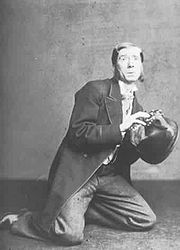
W. S. Gilbert
Sir William Schwenck Gilbert was an English dramatist, librettist, poet and illustrator best known for his fourteen comic operas produced in collaboration with the composer Sir Arthur Sullivan, of which the most famous include H.M.S...
: The Sorcerer
The Sorcerer
The Sorcerer is a two-act comic opera, with a libretto by W. S. Gilbert and music by Arthur Sullivan. It was the British duo's third operatic collaboration. The plot of The Sorcerer is based on a Christmas story, An Elixir of Love, that Gilbert wrote for The Graphic magazine in 1876...
.
D'Oyly Carte years
Grossmith had appeared in charity performances of Trial by JuryTrial by Jury
Trial by Jury is a comic opera in one act, with music by Arthur Sullivan and libretto by W. S. Gilbert. It was first produced on 25 March 1875, at London's Royalty Theatre, where it initially ran for 131 performances and was considered a hit, receiving critical praise and outrunning its...
, where both Sullivan and Gilbert had seen him (indeed, Gilbert had directed one such performance, in which Grossmith played the judge), and Gilbert had earlier commented favourably on his performance in Tom Robertson
Tom Robertson
Thomas "Tom" Robertson was a Scottish international footballer who played for Liverpool in the late 19th and early 20th centuries, helping them to a Football League Championship.-Life and playing career:...
's Society
Society (play)
Society was an 1865 comedy drama by Thomas William Robertson regarded as a milestone in Victorian drama because of its realism in sets, costume, acting and dialogue. Unusually for that time, Robertson both wrote and directed the play, and his innovative writing and stage direction inspired George...
at the Gallery of Illustration. Sullivan mentioned to Arthur Cecil
Arthur Cecil
Arthur Cecil Blunt, better known as Arthur Cecil was an English actor, comedian, playwright and theatre manager. He is probably best remembered for playing the role of Box in the long-running production of Cox and Box, by Arthur Sullivan and F. C...
, the leading tenor from the Gallery of Illustration, that he was looking for someone to play the comic title role in his new comic opera, The Sorcerer. Cecil reminded Sullivan about Grossmith, and Sullivan seized on the idea. After singing for Sullivan, upon meeting Gilbert, Grossmith wondered aloud if the role shouldn't be played by "a fine man with a fine voice". Gilbert replied, "That is exactly what we don't want." Although Grossmith had reservations about cancelling his touring engagements and going into the "wicked" professional theatre (a move that might lose him church and other engagements in the future), and Richard D'Oyly Carte
Richard D'Oyly Carte
Richard D'Oyly Carte was an English talent agent, theatrical impresario, composer and hotelier during the latter half of the Victorian era...
's backers objected to casting a sketch comedian in the central role of a comic opera, Grossmith was hired.
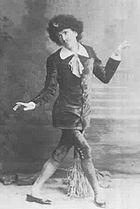
Richard D'Oyly Carte
Richard D'Oyly Carte was an English talent agent, theatrical impresario, composer and hotelier during the latter half of the Victorian era...
's company. He created all nine of the lead comic baritone
Baritone
Baritone is a type of male singing voice that lies between the bass and tenor voices. It is the most common male voice. Originally from the Greek , meaning deep sounding, music for this voice is typically written in the range from the second F below middle C to the F above middle C Baritone (or...
roles in Gilbert and Sullivan's famous Savoy Opera
Savoy opera
The Savoy Operas denote a style of comic opera that developed in Victorian England in the late 19th century, with W. S. Gilbert and Arthur Sullivan as the original and most successful practitioners. The name is derived from the Savoy Theatre, which impresario Richard D'Oyly Carte built to house...
s in London from 1877 to 1889, including the pompous First Lord of the Admiralty, Sir Joseph Porter, in H.M.S. Pinafore
H.M.S. Pinafore
H.M.S. Pinafore; or, The Lass That Loved a Sailor is a comic opera in two acts, with music by Arthur Sullivan and a libretto by W. S. Gilbert. It opened at the Opera Comique in London, England, on 25 May 1878 and ran for 571 performances, which was the second-longest run of any musical...
(1878); Major-General Stanley in The Pirates of Penzance
The Pirates of Penzance
The Pirates of Penzance; or, The Slave of Duty is a comic opera in two acts, with music by Arthur Sullivan and libretto by W. S. Gilbert. The opera's official premiere was at the Fifth Avenue Theatre in New York City on 31 December 1879, where the show was well received by both audiences...
, who is an expert at everything except "military knowledge" (1880); the aesthetic poet, Reginald Bunthorne in Patience
Patience (opera)
Patience; or, Bunthorne's Bride, is a comic opera in two acts with music by Arthur Sullivan and libretto by W. S. Gilbert. First performed at the Opera Comique, London, on 23 April 1881, it moved to the 1,292-seat Savoy Theatre on 10 October 1881, where it was the first theatrical production in the...
(1881); the love-lonely Lord Chancellor
Lord Chancellor
The Lord High Chancellor of Great Britain, or Lord Chancellor, is a senior and important functionary in the government of the United Kingdom. He is the second highest ranking of the Great Officers of State, ranking only after the Lord High Steward. The Lord Chancellor is appointed by the Sovereign...
in Iolanthe
Iolanthe
Iolanthe; or, The Peer and the Peri is a comic opera with music by Arthur Sullivan and libretto by W. S. Gilbert. It is one of the Savoy operas and is the seventh collaboration of the fourteen between Gilbert and Sullivan....
(1882); the sarcastic cripple, King Gama, in Princess Ida
Princess Ida
Princess Ida; or, Castle Adamant is a comic opera with music by Arthur Sullivan and libretto by W. S. Gilbert. It was their eighth operatic collaboration of fourteen. Princess Ida opened at the Savoy Theatre on January 5, 1884, for a run of 246 performances...
(1884); Ko-Ko the cheap tailor, elevated to the post of Lord High Executioner, in The Mikado
The Mikado
The Mikado; or, The Town of Titipu is a comic opera in two acts, with music by Arthur Sullivan and libretto by W. S. Gilbert, their ninth of fourteen operatic collaborations...
(1885); the accursed Robin Oakapple in Ruddigore
Ruddigore
Ruddigore; or, The Witch's Curse, originally called Ruddygore, is a comic opera in two acts, with music by Arthur Sullivan and libretto by W. S. Gilbert. It is one of the Savoy Operas and the tenth of fourteen comic operas written together by Gilbert and Sullivan...
(1887); and the pathetic jester, Jack Point, in The Yeomen of the Guard
The Yeomen of the Guard
The Yeomen of the Guard; or, The Merryman and His Maid, is a Savoy Opera, with music by Arthur Sullivan and libretto by W. S. Gilbert. It premiered at the Savoy Theatre on 3 October 1888, and ran for 423 performances...
(1888). On 29 January 1887, one week after the opening night of Ruddigore, Grossmith fell dangerously ill. However, by 13 February, his physicians pronounced him convalescent, and he resumed the role of Robin by 18 February. During Grossmith's absence, his understudy Henry Lytton
Henry Lytton
Sir Henry Lytton was an English actor and singer who was the leading exponent of the comic patter-baritone roles in Gilbert and Sullivan operas in the early part of the twentieth century...
, who would later become the principal comedian of the company, had the opportunity to perform the role in Grossmith's place.
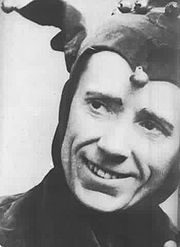
The Times
The Times is a British daily national newspaper, first published in London in 1785 under the title The Daily Universal Register . The Times and its sister paper The Sunday Times are published by Times Newspapers Limited, a subsidiary since 1981 of News International...
noted the comedian's "nimbleness, his diverting tricks, his still more diverting dignity—the dignity of a man of few inches high or round—and his incomparable power of rapid speech and singing." The Daily Telegraph wrote of his Jack Point: "Whether giving expression to poor Jack’s professional wit, or hiding a sorry heart behind light words... Mr Grossmith was master of the part he assumed." In 1883, The Times, reviewing a matinee performance of Iolanthe, wrote: "Mr. Grossmith's impersonation of the Lord Chancellor has ... become an exquisitely refined satire." On the other hand, his sketch comedy background had trained Grossmith to improvise comic business. Gilbert and the actor had a famous exchange during rehearsals for The Mikado about an improvised bit of "business" in which Jessie Bond
Jessie Bond
Jessie Bond was an English singer and actress best known for creating the mezzo-soprano soubrette roles in the Gilbert and Sullivan comic operas. She spent twenty years on the stage, the bulk of them with the D'Oyly Carte Opera Company.Musical from an early age, Bond began a concert singing...
pushed Grossmith, as they kneeled before the Mikado, and he rolled completely over. Gilbert requested that they cut out the gag, and Grossmith replied: "but I get an enormous laugh by it". Replied Gilbert: "So you would if you sat on a pork pie."
The actor, famously jittery on opening nights, is depicted both on and off stage in the biographical film
Biographical film
A biographical film, or biopic , is a film that dramatizes the life of an actual person or people. They differ from films “based on a true story” or “historical films” in that they attempt to comprehensively tell a person’s life story or at least the most historically important years of their...
, Topsy Turvy. It was reported that he was addicted to morphine, and in the film he is shown injecting himself on the opening night of The Mikado. In his diary, Arthur Sullivan wrote afterwards, "All went very well except Grossmith, whose nervousness nearly upset the piece". Grossmith spoke self-deprecatingly about his own vocal prowess (Sullivan and others disagreed):
- Of course, I haven’t any voice to speak of, but I have a great register, and Sullivan used to amuse himself by making me sing bass in one number of an opera and tenor in another. In 'Ruddygore', Sir Arthur had engaged a man to play the servant, my menial, so to speak, who had an enormous bass voice, and who had to go down to the lower E flat. Singularly enough, he could go down to G, and then he dropped out entirely, and I did the [low E-flat] below. Generally the audience roared with laughter, and it absolutely brought down the house.
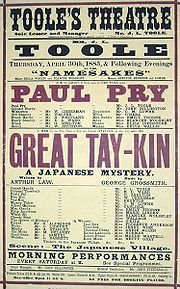
D'Oyly Carte Opera Company
The D'Oyly Carte Opera Company was a professional light opera company that staged Gilbert and Sullivan's Savoy operas. The company performed nearly year-round in the UK and sometimes toured in Europe, North America and elsewhere, from the 1870s until it closed in 1982. It was revived in 1988 and...
, Grossmith's father and mother died (in 1880 and 1882, respectively). Throughout this period, Grossmith continued to perform his sketches, often late at night after performing at the Savoy, and continued to write new sketches, such as Amateur Theatricals (1878), A Juvenile Party (1879), A Musical Nightmare (1880), and A Little Yachting (1886). He also wrote the music for Arthur Law
Arthur Law
William Arthur Law , better known as Arthur Law, was an English playwright, actor and scenic designer.-Life and career:...
's short comic opera, Uncle Samuel
Uncle Samuel
Uncle Samuel is a one-act comic opera with a libretto by Arthur Law and music by George Grossmith. It was first produced at the Opera Comique on 3 May 1881 to 8 October 1881, as companion piece to Patience. The piece also toured from December 1887 to June 1888 as a companion piece to H.M.S...
(1881), the one-act curtain raiser that preceded Patience on the Opera Comique
Opera Comique
The Opera Comique was a 19th-century theatre constructed in Westminster, London, between Wych Street and Holywell Street with entrances on the East Strand. It opened in 1870 and was demolished in 1902, to make way for the construction of the Aldwych and Kingsway...
programme. His Cups and Saucers was revived and played with Pinafore and also played by the company on tour. Other comic operas by Grossmith during these years included Mr Guffin’s Elopement (1882) and A Peculiar Case (1884, both with libretti by Arthur Law) and The Real Case of Hide and Seekyll (1886). Grossmith also continued to give his "society" and other entertainments, often late at night after his performance at the Savoy. He also composed the music for another comic opera, The Great Tay-Kin and another piece, both with libretti by Arthur Law, which were performed at Toole's Theatre in 1885.
Grossmith also wrote, composed, and performed in several one-man drawing room sketches, short comic operas or monologues that were given at the Opera Comique or the Savoy Theatre
Savoy Theatre
The Savoy Theatre is a West End theatre located in the Strand in the City of Westminster, London, England. The theatre opened on 10 October 1881 and was built by Richard D'Oyly Carte on the site of the old Savoy Palace as a showcase for the popular series of comic operas of Gilbert and Sullivan,...
in place of the companion pieces when shorter matinee programmes were playing. These works included Beauties on the Beach (1878), Five Hamlets (1878), a revival of his A Silver Wedding (1879), The Drama on Crutches (1883), Homburg, or Haunted by The Mikado (1887–88), and Holiday Hall (1888). In reviewing a matinee performance of The Drama on Crutches, The Times commented, "he not only satirizes the present tendency of fashionable amateurs to join the stage, but also parodies ... the manner of Mr. Irving
Henry Irving
Sir Henry Irving , born John Henry Brodribb, was an English stage actor in the Victorian era, known as an actor-manager because he took complete responsibility for season after season at the Lyceum Theatre, establishing himself and his company as...
and other actors of the present day, including himself. The sketch created great amusement, though of course, it depends entirely for its success upon the actor's powers of mimicry." Grossmith also performed in charity events, including as Bouncer in Cox and Box
Cox and Box
Cox and Box; or, The Long-Lost Brothers, is a one-act comic opera with a libretto by F. C. Burnand and music by Arthur Sullivan, based on the 1847 farce Box and Cox by John Maddison Morton. It was Sullivan's first successful comic opera. The story concerns a landlord who lets a room to two...
in 1879 at the Opera Comique.
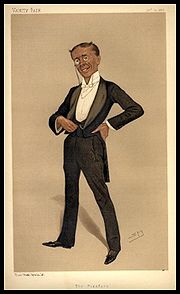
Façade (poem)
Façade is a series of poems by Edith Sitwell, best known as part of Façade – An Entertainment in which the poems are recited over an instrumental accompaniment by William Walton. The poems and the music exist in several versions....
by Edith Sitwell
Edith Sitwell
Dame Edith Louisa Sitwell DBE was a British poet and critic.-Background:Edith Sitwell was born in Scarborough, North Yorkshire, the oldest child and only daughter of Sir George Sitwell, 4th Baronet, of Renishaw Hall; he was an expert on genealogy and landscaping...
and William Walton
William Walton
Sir William Turner Walton OM was an English composer. During a sixty-year career, he wrote music in several classical genres and styles, from film scores to opera...
. Other songs written during this period included "An Awful Little Scrub" (1880), "The Speaker’s Eye" (1882), "The ‘Bus Conductor’s Song" (1883), "How I Became an Actor" (1883), "See Me Reverse" (1884), "The Lost Key" (1885), and "The Happy Fatherland" (1887).
Later years
Grossmith left the D'Oyly Carte company near the end of the original run of The Yeomen of the Guard on 17 August 1889 and resumed his career entertaining at the piano, which he continued to do for more than 15 years afterwards. Despite his dislike of travelling, he toured in Britain, Ireland, and, on five occasions, North America. His drawing-room sketches included his own popular songs, such as "See me Dance the Polka", "The Happy Fatherland", "The Polka and the Choir-boy", "Thou of My Thou", "The French Verbs", "Go on Talking - Don’t Mind Me", "I Don’t Mind Flies". His new sketches during this period included Modern Music and Morals (1889), On Tour; or, Piano and I (1891), A Seaside Holiday (1892), Fashionable Music (1892) and Is Music a Failure? (1892). According to The Times, "His genial satire was enjoyed even by those at whom its shafts were aimed." When he toured Scotland in the autumn of 1890, Grossmith gave a command performanceRoyal Command Performance
For the annual Royal Variety Performance performed in Britain for the benefit of the Entertainment Artistes' Benevolent Fund, see Royal Variety Performance...
for Queen Victoria at Balmoral Castle
Balmoral Castle
Balmoral Castle is a large estate house in Royal Deeside, Aberdeenshire, Scotland. It is located near the village of Crathie, west of Ballater and east of Braemar. Balmoral has been one of the residences of the British Royal Family since 1852, when it was purchased by Queen Victoria and her...
. He also composed the music for a three-act comic opera with a libretto by Gilbert, Haste to the Wedding
Haste to the Wedding
Haste to the Wedding is a three-act comic opera with a libretto by W. S. Gilbert and music by George Grossmith, based on Gilbert's 1873 play, The Wedding March. The opera was the most ambitious piece of composition undertaken by Grossmith....
(1892). In this piece, his son George Grossmith, Jr.
George Grossmith, Jr.
George Grossmith, Jr. was a British actor, theatre producer and manager, director, playwright and songwriter, best remembered for his work in and with Edwardian musical comedies...
made his stage debut. Musically more challenging than any composition he had attempted before, this work was unsuccessful. Later, however, Grossmith said that the experience of writing with Gilbert was one of the happiest of his life. In 1892–93 he toured North America (his second tour there), writing successful new sketches, "How I Discovered America" and "Baby on the Shore" (1893).
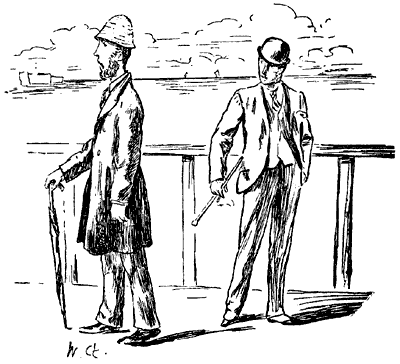
Weedon Grossmith
Walter Weedon Grossmith , better known as Weedon Grossmith, was an English writer, painter, actor and playwright, best known as co-author of The Diary of a Nobody with his famous brother, music hall comedian and Gilbert and Sullivan star, George Grossmith...
to expand a series of amusing columns they had written in 1888–89 for Punch
Punch (magazine)
Punch, or the London Charivari was a British weekly magazine of humour and satire established in 1841 by Henry Mayhew and engraver Ebenezer Landells. Historically, it was most influential in the 1840s and 50s, when it helped to coin the term "cartoon" in its modern sense as a humorous illustration...
. The Diary of a Nobody was published as a novel and has never been out of print since. The book is a sharp analysis of social insecurity, and Charles Pooter of The Laurels, Brickfield Terrace, Holloway, was immediately recognized as one of the great comic characters of English literature. The work has itself been the object of dramatisation and adaptation, including three times for television: 1964, 1979 and 2007.
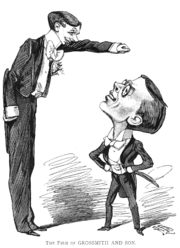
His Excellency (opera)
His Excellency is a two-act comic opera with a libretto by W. S. Gilbert and music by F. Osmond Carr. The piece concerns a practical-joking governor whose pranks threaten to make everyone miserable, until the Prince Regent kindly foils the governor's plans...
, with music by Frank Osmond Carr
Frank Osmond Carr
Frank Osmond Carr , known as F. Osmond Carr, was an English composer who wrote the music for some of the earliest musical comedies.-Life and career:...
. Also in 1897, he played briefly as King Ferdinand V of Vingolia in F. C. Burnand's His Majesty at the Savoy Theatre and made two more short London stage appearances thereafter, as Scoones in Young Mr Yarde (1898) and Lambert Simnel in The Gay Pretenders (1900). An 1896 interview of Grossmith reveals him feeling his age and considering the end of his touring career, while enjoying time spent at home with his family, dogs and antique piano collection. Grossmith suffered from depression after the death of his wife of cancer in 1905, and his health began to fail, so that he increasingly missed engagements. He was nevertheless persuaded to continue giving his entertainments, which he did on a less frequent basis, until November 1908. The following year, Grossmith retired to Folkestone, Kent, a town that he had visited for many years, where he wrote his second volume of reminiscences, Piano and I (1910).
Grossmith died at his home in Folkstone at the age of 64. He is buried in Kensal Green Cemetery
Kensal Green Cemetery
Kensal Green Cemetery is a cemetery in Kensal Green, in the west of London, England. It was immortalised in the lines of G. K. Chesterton's poem The Rolling English Road from his book The Flying Inn: "For there is good news yet to hear and fine things to be seen; Before we go to Paradise by way of...
, in the London Borough of Brent
London Borough of Brent
In 1801, the civil parishes that form the modern borough had a total population of 2,022. This rose slowly throughout the 19th century, as the district became built up; reaching 5,646 in the middle of the century. When the railways arrived the rate of population growth increased...
. In his will
Will (law)
A will or testament is a legal declaration by which a person, the testator, names one or more persons to manage his/her estate and provides for the transfer of his/her property at death...
, dated 26 October 1908, Grossmith left small bequests to a variety of charities and persons; 2,000 pounds, artworks and heirlooms to each of his children (except that Lawrence did not receive a specific cash bequest), his son George receiving also "two silver bowls presented to him by [Gilbert, Sullivan and] Carte [and] the ivory baton with which he conducted the orchestra on the occasion of his said son's first appearance on the stage" in Haste to the Wedding; and smaller bequests to his children's spouses and his nieces, nephews, grandchildren and some cousins, with the residuary estate shared equally by his children (although the residuary estate was not large).
Writings and compositions; legacy; recordings
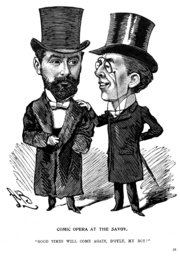
Comic opera
Comic opera denotes a sung dramatic work of a light or comic nature, usually with a happy ending.Forms of comic opera first developed in late 17th-century Italy. By the 1730s, a new operatic genre, opera buffa, emerged as an alternative to opera seria...
s, nearly 100 musical sketches, some 600 songs and piano pieces, and three books. He also wrote both serious and comic pieces for newspapers and magazines throughout his career, displaying a wide range of styles.
Grossmith was followed, in the Gilbert and Sullivan comic roles, by a number of other popular performers, including Henry Lytton
Henry Lytton
Sir Henry Lytton was an English actor and singer who was the leading exponent of the comic patter-baritone roles in Gilbert and Sullivan operas in the early part of the twentieth century...
, Martyn Green
Martyn Green
William Martyn-Green , better known as Martyn Green, was an English actor and singer. He is best known for his work as principal comedian in the Gilbert & Sullivan comic operas, which he performed and recorded with the D'Oyly Carte Opera Company and other troupes.After army service in World War I,...
, Peter Pratt
Peter Pratt
Peter Pratt was an English actor and singer who is best remembered for his comic roles in the Gilbert and Sullivan comic operas....
, John Reed
John Reed (actor)
John Lamb Reed, OBE was an English actor, dancer and singer, known for his nimble performances in the principal comic roles of the Savoy Operas, particularly with the D'Oyly Carte Opera Company...
, and many others, who each owed a debt to Grossmith as the creator of the roles. Many actors have portrayed Grossmith in biographical films, revue
Revue
A revue is a type of multi-act popular theatrical entertainment that combines music, dance and sketches. The revue has its roots in 19th century American popular entertainment and melodrama but grew into a substantial cultural presence of its own during its golden years from 1916 to 1932...
s and sketches. In Britain, among others, Martyn Green, John Reed (in A Song to Sing O
A Song to Sing O
A Song to Sing O is a one-man musical play by Melvyn Morrow, with music by Arthur Sullivan and George Grossmith, and lyrics by W. S. Gilbert and Grossmith, about the life of comedian and actor George Grossmith, who originated the principal comic roles for the most famous Gilbert and Sullivan operas...
at the Savoy Theatre in 1981), Simon Butteriss and Leon Berger have done so. Australian Anthony Warlow
Anthony Warlow
Anthony Warlow is an Australian opera and musical theatre performer, noted for his character acting and considerable vocal range ....
played Grossmith in A Song to Sing, O in 1987.
Over forty of the songs that Grossmith wrote or performed in his one-man shows have been recorded by baritone Leon Berger (a British Gilbert & Sullivan singer and Grossmith scholar), accompanied by Selwyn Tillett (G&S scholar) on two CDs: A Society Clown: The Songs of George Grossmith and The Grossmith Legacy. The latter also contains the recorded voice of Grossmith's son, George Grossmith Jr. Both are on the Divine Art Label. No known recordings of Grossmith's voice are known to exist, although wax cylinder recording technology was available during his lifetime.

